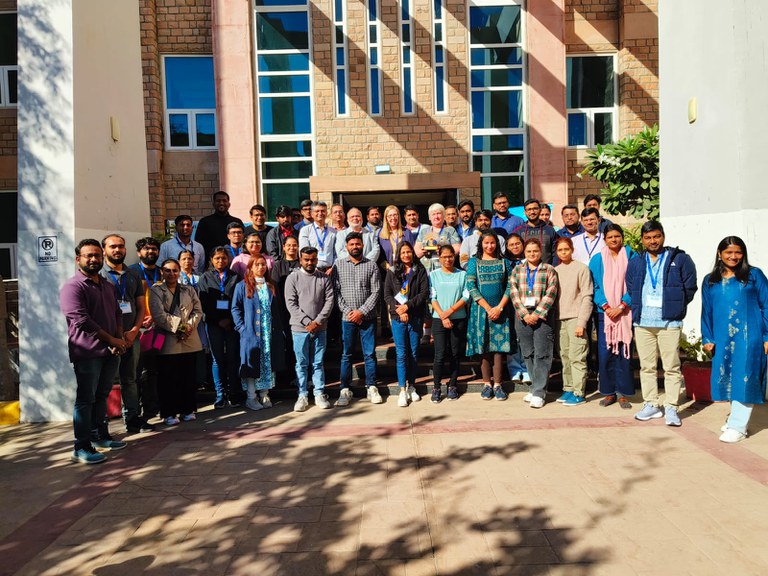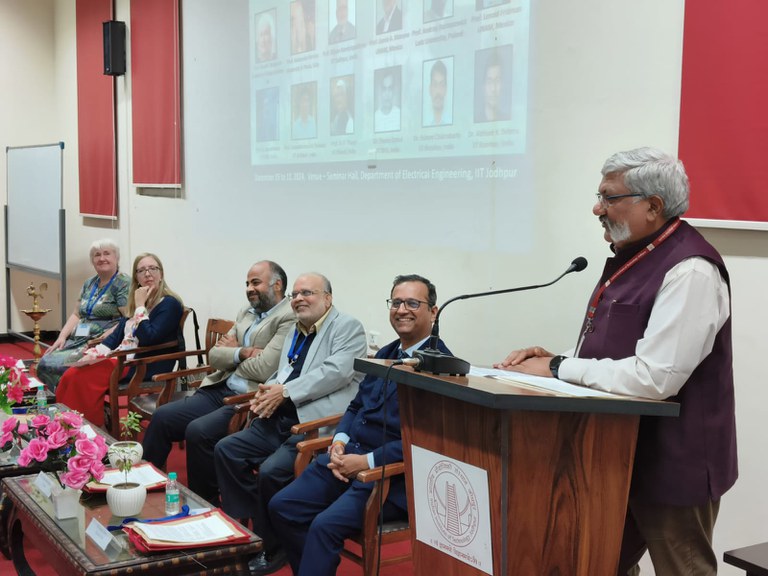Graduate School on Advanced Sliding Mode Control
Activity Organizer:
Bijnan Bandyopadhyay, Indian Institute of Technology Jodhpur, Jodhpur, India;
IFAC Sponsor: Advanced Control & Dynamic Optimization Society (ACDOS), India; bijnan@iitj.ac.in
Description:
The Graduate School on Advanced Sliding Mode Control (ASMC), supported by the IFAC Activity Fund, was held at the beautiful campus of the Indian Institute of Technology (IIT) Jodhpur, Jodhpur, India, from 5-10 December 2024. This school received financial support from the IFAC Activity Fund through its project call in April 2024. This project was led by Prof. Bijnan Bandyopadhyay with endorsement by the Automatic Control and Dynamic Optimization Society (ACDOS), which is the Indian National Member Organization of the IFAC. The school was organized by Prof. Bijnan Bandyopadhyay (IIT Jodhpur), Prof. Deepakkumar M. Fulwani (IIT Jodhpur), Dr. Jayesh Barve (ACDOS) and Dr. Abhisek K. Behera (IIT Roorkee). A total of 41 participants attended this school, which included students, faculty members, and research scientists from all over India. Of this, 18 (around 44%) were female participants, including 14 Young Women (below 30 years of age).
We had the great pleasure of having Prof. Sarah K. Spurgeon from the University College London, UK, and Prof. Antonella Ferrara from the University of Pavia, Italy, in person as expert lecturers for this event. Other speakers include Prof. Bijnan Bandyopadhyay, Prof. Deepakkumar M. Fulwani, Dr. Shyam Kamal (India), Dr. Sohom Chakrabarty (India), and Dr. Abhisek K. Behera. Apart from that, many distinguished speakers, viz., Prof. Leonid Fridman (Mexico), Prof. Jaime A. Moreno (Mexico), Prof. Andrzej Bartoszewicz (Poland), Dr. Paweł Latosiński (Poland), Prof. S. Janardhanan (India), and Prof. Akhilanand P. Tiwari (India) also delivered the online talks in this school. The school began with tutorial sessions on mathematical background and fundamentals on sliding mode control on the first day, followed by technical talks in the next five days. There were five talks on each day with three in the morning session followed by two talks in the afternoon session after the lunch break. Most of the talks were on the advanced topics of sliding mode control, such as high-order sliding mode control, constrained sliding mode control, sliding mode observer, discrete-time sliding mode control, event-triggered sliding mode control, etc., including a few introductory sessions. Many topics on the applications of sliding mode control theory were also a part of this school, e.g., robotics, microgrids, nuclear reactors, and power converters. The participants were allowed to interact with the speaker at the end of each talk and informally during the break. The last session of the school ended with a valedictory function and certificate distribution to all participants, which included photo sessions.
The organizing committee is very thankful to Prof. Avinash K. Agarwal, Director, IIT Jodhpur, Prof. Bharat Singh Rajpurohit, Head, Department of Electrical Engineering, IIT Jodhpur and the administration of IIT Jodhpur, for providing us with the necessary support to run the school. Many volunteers (Ankita, Dev Vrat, Mohit, Rahul) have been actively involved in various activities since the very beginning of this school at Jodhpur. We also succeeded in arranging accommodation for all our participants and speakers on the IIT Jodhpur campus. Many thanks to the IFAC Activity Fund Committee Chair for approving the fund used for the travel costs of all the speakers, providing free accommodation for 14 Young Women participants during the whole event duration, and also reimbursing the return travel fare from their workplace, etc. We also acknowledge the support received from Electronic Devices Worldwide Pvt. Ltd, Mumbai. Finally, we are truly confident that all attendees enjoyed their stay at the six-day event on campus and visited the historic city of Jodhpur, which has a rich cultural heritage.



